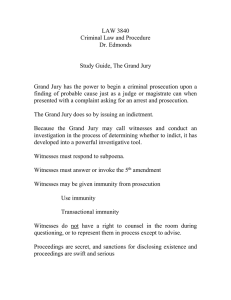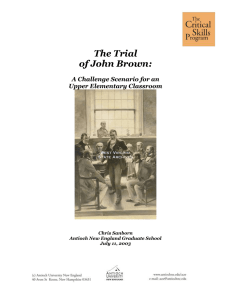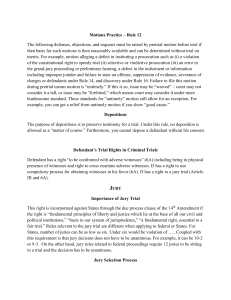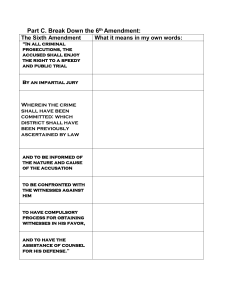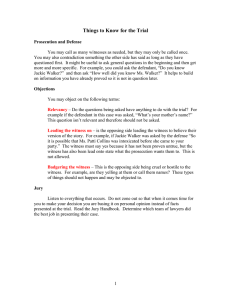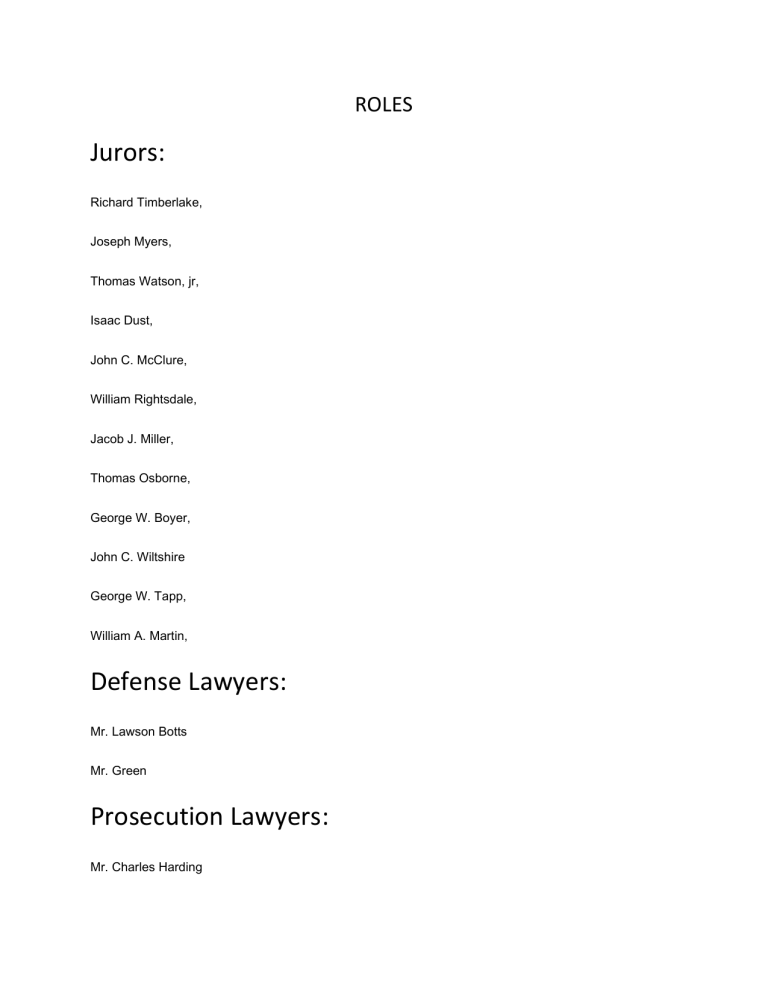
ROLES Jurors: Richard Timberlake, Joseph Myers, Thomas Watson, jr, Isaac Dust, John C. McClure, William Rightsdale, Jacob J. Miller, Thomas Osborne, George W. Boyer, John C. Wiltshire George W. Tapp, William A. Martin, Defense Lawyers: Mr. Lawson Botts Mr. Green Prosecution Lawyers: Mr. Charles Harding Mr. Andrew Hunter Defense Witnesses: Joseph Brewer Major Mills Fr John Brown (the accused) Prosecution Witnesses: Conductor Phelps Colonel Washington Armstead Ball John Allstadt News Reporter: Northern Reporter Southern Reporter FACT SHEET: This sheet is to be read by the judge at the beginning of this trial. This should be presented as being agreed upon by both sides and is merely intended to give the jury background information about this trial. On October 16, 1859, John Brown and a group of his followers entered the town of Harper’s Ferry, Virginia. While there, they took weapons from the Federal Arsenal, where over 20,000 rifles were kept by the United States Military. Prisoners were taken and a hostage situation ensued. Brown’s men cut telegraph wire and surrounded the arsenal. When the townspeople learned of this situation, they joined members of the state militia and surrounded Brown and his men who were inside the fort. The townspeople gained control of the bridge behind the armory. Brown and his men took prisoners inside the local town’s fire engine house, where they barricaded themselves. Throughout the next three days, shots were exchanged between Browns men and the townspeople/militia. President James Buchanan ordered Col. Robert E. Lee to lead marines in capturing Brown and his men. On October 19, Col. Lee offered Brown and his men one last time an opportunity to surrender. When they refused to surrender, Lee ordered the marines under leadership of Lt. Israel Greene to break down the doors of the Fire House, which they did. Brown was struck by a saber from Lt. Israel Greene multiple times and was arrested. He made a statement following his arrest. He now stands trial for the following: -Treason -Leading a rebellion -Murder General Notes Prosecutors: Mr. Charles B. Harding and his Assistant Mr. Andrew Hunter Defense Attorneys: Mr. Lawson Botts and his Assistant Mr. Green Charges: Leading Slaves into insurrection; Treason; Murder Brown’s Lawyers and many abolitionists wanted him to plead insanity; letters were sent on his behalf stating that insanity ran in his family; Brown rejected all such calls for this plea. Brown often lay on a cot during the trial, having been given permission not to stand due to injuries. PROSECUTION: ROLE SHEET OPENING STATEMENT: Throughout this trial, you will hear of the terrible actions of Mr. John Brown, who led a rebellion in the great state of Virginia. He is an evil man, who organized a killing of a bridge-keeper, held citizens of our state as prisoners of war, and seized slaves from their masters, all in the hopes of rebelling against the law. We will ask that you find him guilty of murder and rebellion for these acts. We will further prove that Mr. Brown committed treason: which is levying war against the State, giving comfort to its enemies, or establishing any other government within its limits. Such acts are all punishable with death. We will prove that Mr. Brown sought to rob citizens of their slave property, carry them off by violence and holding them against their will. We will prove these points beyond all reasonable doubt. I ask the jurors to remain fair and open throughout this trial, and appreciate your time in helping our great state carry out Justice. YOUR TASK: -Convince members of the jury to find John Brown guilty. -Read through the role sheets of all the witnesses. Prepare direct-examination (for your witnesses) and cross-examination questions (for the prosecution’s witnesses) for each of the witnesses. -Prepare a “closing statement” where you try to convince jurors to support your side. During the Trial: -Deliver Opening Statements -Question Witnesses -Deliver Closing Statements -Object when appropriate DEFENSE: ROLE SHEET OPENING STATEMENT: Good day members of the jury. I would like to thank you for your service throughout this most important of all trials. You will hear members of the other side argue a lot of things about my defendant, the good Mr. John Brown. As you listen to this case, I ask you to stay open minded and to remember that the defense must prove its case beyond all reasonable doubt. If you are left with any doubts, you must find Mr. Brown innocent. Bear in mind that the prosecution must convince you that Mr. Brown committed acts of treason, and must have the witness of two men to do so. Bear in mind that you must be convinced that Mr. Brown purposely and knowingly killed someone to find him guilty of murder. This trial is an unusual one, and the stakes could not be higher. Yet, we are confident you will find our defendant not guilty. Thank you! YOUR TASK: -Convince members of the jury to find John Brown NOT guilty. -Read through the role sheets of all the witnesses. Prepare direct-examination (for your witnesses) and cross-examination questions (for the prosecution’s witnesses) for each of the witnesses. -Prepare a “closing statement” where you try to convince jurors to support your side. During the Trial: -Deliver Opening Statements -Question Witnesses -Deliver Closing Statements -Object when appropriate CONDUCTOR PHELPS: PROSECUTION WITNESS You arrived to Harper’s Ferry Virginia on Saturday October 15 at 1:25 while conducting your train. You noticed there was no watchman at the bridge, and thought that was strange. As you stopped the train and were talking to a bridge engineer, you were approached by the watchman who, was very nervous, and told you he had been attacked by men at the bridge carrying rifles. You then attempted to cross the bridge with your train, but saw men pointing rifles at you. A free black man, Hayward Shepherd, who was a baggage handler on your train then approached you. He had been shot when he asked the raiders what they were doing. You carried him to the railroad office, where he died. You never saw any Federal soldiers shoot at John Brown’s men until after Shepherd had been shot. As you went to the railroad office, you watched several soldiers being fired at and returning fire. When you approached one of the rebels firing at the soldiers, you asked what he was doing. He said he “wanted liberty, and was willing to fight for it.” You also saw men running back and forth from the armory to wagons, putting items in their carriages. The same day at around 3 o’clock in the morning, you spoke with leaders of the rebel group. A leader apologized to you and stated that he never meant any harm to happen to you. You then spoke to John Brown (whom his men called Captain John Smith), who told you that no blood shed was meant to occur on the bridge and he was sorry your train was stopped. He promised you your train could cross safely. John Brown and two other men rode on your train with you across the bridge, allowing you to cross safely. Brown had threatened to take all the passengers on the train prisoner if you did not keep the train going, but you felt that he was more trying to hurry you along than actually threaten anyone. Brown also said to you that he had not ordered anyone to be killed on the bridge. You do not believe John Brown was one of the men pointing rifles at the bridge the night that Shepherd was shot, as Brown had a “peculiar” beard and you would have remembered him. Before getting off your train after riding with you across the bridge, Brown had said to you: "You doubtless wonder that a man of my age should be here with a band of armed men, but if you knew my past history you would not wonder at it as much.” You alerted the President of the Baltimore and Ohio Railroad what had happened, as you made your way down the line from the bridge of what was happening to the next railroad station. He contacted President Buchanan and Governor Wise. PROSECUTION QUESTIONS: 1. Where were you at 1:25 am the night of October 15, 1869? 2. As you approached the bridge, was there anything strange you noticed? What was it? 3. Can you describe your interactions with the watchmen that night? 4. Did you know Hayward Shepherd? Can you tell the jury what happened to him that night? 5. After the shooting, did you try to take your train across the bridge? What happened? 6. Did you see soldiers shooting at John Brown’s men? Was this before or AFTER Brown’s men had been shooting? DEFENSE QUESTIONS 1. Did you interact with John Brown at all the night of these events? Can you describe what your interaction was with him? 2. Did John Brown tell you whether or not he intended for people to die that night? 3. How were you finally able to cross the bridge? So, to be clear, Brown escorted you safely across the bridge? 3. As an eyewitness, did you see John Brown on the bridge pointing rifles at your train and shooting that night? How do you know (answer: his beard)? COLONEL LEWIS W. WASHINGTON: PROSECUTION WITNESS ROLE SHEET After his arrest, John Brown was interrogated by Governor Wise of Virginia. You were there during this conversation. You heard Brown say that he chose Harper’s Ferry to carry out his raid as it was a border between Maryland and Virginia and would be a good place to start his own, new government. Brown also said his goal was to free all the slaves of the south and that he had 200 Sharpe's rifles, 200 revolvers, and a lot of spears, but you can’t remember the number. You remember that Brown said he had enough weaponry to arm about 1,500 men. You were also present during the time of the raid by the Marine’s on the Fire House where Brown and his men had retreated. You were being held prisoner, as you had worked at the armory. Brown and his men never insulted you, and you heard Brown tell his men “Do not fire on any unarmed man” more than once. Also, when you entered the Fire House, all of Brown’s prisoners were at the rear of the house, out of the line of fire from the Marines, as Brown had ordered them to be kept there. It seemed to you that the black slaves in the compound were not voluntarily arming themselves to fight against the marines. You also overheard one of Brown’s men ask a fellow soldier being held prisoner “Are you in favor of slavery?” When the man said “yes I am, even though I have no slaves”, you heard Brown’s man reply “Then you are the first I would hang!” When the marines ran into the fire house, you only heard one of Brown’s men yell “Surrender” while the rest seemed to fight the marines. You saw Brown get stabbed by one of the marines. QUESTIONS BY PROSECUTION: 1. Can you describe to the jury your interactions with John Brown? What experiences have you had with him? 2. As Brown was being interrogated by Gov. Wise, you were present for this, correct? Did Brown mention why he chose Harper’s Ferry? What did he say? (MAKE SURE HE MENTIONS HE WANTED A NEW CONSTITUTION THIS COULD PROVE TREASON) 3. Did Brown mention how much weaponry he had? How much? 4. The defendant claims that he was there to help lead a slave uprising. Did you see any slaves during your time there? Did they seem like they were happy to be armed? 5. When the marines broke into the compound, did Brown’s men surrender? Can you describe that scene. QUESTIONS BY DEFENSE: 1. While you and other prisoners were being held in the Fire House as Brown and his men retreated there, can you explain to the court where the prisoners were located? So, Brown, a supposedly brutal murder, actually kept the prisoners BEHIND his men to protect them? Is that correct? 2. While Brown was inside the Fire House, did you hear him give any orders to his men about shooting at others? What were these orders? 3. Did you ever hear John Brown state why he was at Harper’s Ferry? What reason did he give? ARMSTEAD BALL: PROSECUTION WITNESS You were the master machinist at the armory in Harper’s Ferry. You were awakened while resting at the armory by someone who told you that people were stealing weapons from the armory. When you ran to the gate to see what was happening, you were grabbed by two men and taken prisoner. John Brown, clearly the leader of the group, told you he was hoping to free the slaves and that you would be safe, as he was fighting slavery, not the people of the country. Brown allowed you to back to your family home, with two accompanying guards, to let them know you were okay and to eat breakfast. You were then brought back to the armory by the guards and held prisoner. As you were held hostage in the engine house, you noticed three or four black slaves carrying spears, but all seemed to be very scared. You also overheard Captain Brown state that one of his sons had lay dead, and had been killed while waving a white flag of truce. You did not know that Brown’s sons were with him until you heard this. You also overheard Brown say he would only shoot at marines for self defense. PROSECUTION QUESTIONS: 1. Can you describe your role inside the armory of Harper’s Ferry? 2. During the events of the raid by John Brown, can you describe to the jury what happened to you? 3. Were you held prisoner by John Brown? 4. Did you happen to see any black slaves during your time at the armory, while being held prisoner? Did they appear to be happy to be fighting with John Brown? What was their demeanor? DEFENSE WITNESS: 1. When you were taken prisoner, did John Brown intimidate you? What was his demeanor? What did he say to you? 2. During the events in the engine house, did you hear any mention of John Brown’s sons? What did you hear? And according to what you heard, how did Brown’s son die? JOHN ALLSTADT: PROSECUTION WITNESS You lived in Harper’s Ferry, Virginia. On the night of the raid, you were awakened by two men who told you to “Get up quick, or we will burn you up.” They told you they were leading an uprising of slaves, and that it would start with you. They gave your seven slaves each a spear and took you and the slaves to the Armory. While at the armory, you met John Brown and were held hostage in the Fire House. While being held hostage, you heard Brown say that he was upset that one of his men had killed the unarmed, popular mayor of Harper’s Ferry. When the marines were preparing to enter the Fire House, you saw John Brown and others pointing their guns at the door, waiting for the marines. When shots were fired, you thought Brown may have fired the shot that killed the first marine, as John Brown was at the front of the line of men with guns, but you are not sure as it all happened so fast and shots had been fired before the door was even broken open. PROSECUTION QUESTIONS: 1. During the events at Harper’s Ferry, when John Brown and his men raided the armory, where were you? Can you describe how you came to be at the armory? 2. What did the men who awakened you and kidnapped you tell you? 3. As the marines were preparing to barge into the fire house and rescue you and the other prisoners, where was John Brown? 4. Who do you think killed the poor young marine who died entering the fire house to save you? Why do you believe John Brown was the man who fired this deadly shot? DEFENSE QUESTIONS: 1. During the exchange of fire between Brown’s men and the militia and townspeople, the beloved mayor of Harper’s Ferry was shot dead. Did Brown react to this shooting? What was his reaction? 2. You said you THINK that John Brown fired the deadly shot which killed the first marine through the door, but are you 100% certain it was Brown? Why are you not sure? (SO, you actually have no idea who killed the marine, is that true? Thank you) JOSEPH A. BREWER: DEFENSE WITNESS You were being held prisoner by John Brown and his men in the engine house during the raid. You believe Brown to be a good, honest man. In fact, after you saw a citizen outside of the fire house get shot, you asked Brown if you could go help him. He allowed you to leave, and you helped carry the citizen to safety, only to return to the Engine House, because you had promised Brown you would return if he let you go help. You believe Brown treated you and all of the prisoners kindly. He allowed you to hide yourselves as citizens and militia fired at the engine house, and he kept you in the back of the engine house, putting himself and his men in front of you. Yet, Brown would not allow the prisoners to leave freely. Also, you saw one of Brown’s men go outside waving a flag of truce, only to be shot while leaving. DEFENSE QUESTIONS: 1. During the raid on Harper’s Ferry where were you? 2. So, just to clarify, you were actually held Prisoner by John Brown, yet you are here today as a witness on his behalf, is that correct? 3. How would you describe John Brown, the man who the prosecution describes as a ruthless murderer? 4. Why do you feel John Brown was a good and decent man? 5. Were you allowed to leave the Fire House at all during the time Brown and his men were trying to negotiate with the military? Can you describe that to the jury? 6. So, you left the Engine house only to RETURN because you felt you should keep your promise to Brown, is that correct? 7. While in the Prison house, did you ever see anyone from Brown’s group try to offer a truce or talk with the marines? What happened to that person who was attempting to surrender? PROSECUTION QUESTIONS: 1. Were you free to leave the engine house at any moment once taken forcibly inside by Brown and his men? 2. So, you were a prisoner, is that correct? Thank you! MAJOR MILLS: DEFENSE WITNESS You were held prisoner in the Engine House during the raid by Brown and his men. While you were in there, citizens of the town and members of the militia were firing at the engine house. Brown told you and the other prisoners that he was more concerned for your safety than his own. He spoke with you about terms of release and an agreement was written, whereas you and the other prisoners could be released if Brown and his men could move to a more secure location. The townspeople rejected this agreement. You saw Brown’s son go out with a white truce flag to talk to the townspeople. You knew that he was going to talk about terms of your release. He was shot and returned badly wounded. You helped him, spoke to him, and gave him water to try to take away his pain. You heard Brown say that the town people were acting like barbarians, but Brown never seemed to be angry. You also overheard Brown say that he expected more men to come to his rescue the next day. Even while the fire house was being shot at, you overheard Brown telling his men to shoot at no unarmed person, and only to return fire. You believe Brown’s cause was wrong and his actions illegal, but you also believe him to be a good man. DEFENSE QUESTIONS: 1. Can you describe to the jury where you were during the events of John Brown’s raid. 2. So, just to clarify, you were also a prisoner of John Brown’s, yet you are here to testify on his behalf, is that correct? 3. While inside the Engine House, did Brown ever mention your safety or threaten you? Please explain. 4. While Brown was holed up in the engine house, did he ever try to make an agreement with the townspeople? What happened with that? 5. After Brown’s son was shot, while holding a white flag of truce I may remind the jury, what did you do? 6. Did you ever hear John Brown order his men to fire on unarmed people? In your opinion, is John Brown a murderer? 7. Would you say John Brown was a good man or a bad man? PROSECUTION QUESTIONS 1. Were you free to leave the Engine house at any time? So, just to clarify, Brown held you PRISONER? Is that correct? 2. You state that Brown told his men not to fire on unarmed men. What about armed men, like the marines, who were trying to free you and other prisoners? Did he also tell them not to fire at them? 3. You stated John Brown seems like a good man. In your opinion, was John Brown a criminal? Were his actions illegal? JOHN BROWN: DEFENSE WITNESS AND THE ACCUSED You were born May 9, 1800 to very religious parents in Connecticut. From a young age, you were taught to hate slavery. While a young boy, you made friends with a slave, whom you saw beaten regularly and forced to sleep in the cold with only rags covering his body. You helped slaves escape to freedom throughout your life, working on the Underground Railroad. Additionally, you started a school for blacks and were kicked out of your church when you demanded that two black servants be allowed to sit in the same pew as you. You are a strong Christian, who believes the bible teaches love and acceptance, and you find Slavery to be against God’s will. You have devoted your life to fighting on behalf of slaves. You used to believe that people should work peaceably to top slavery, but your long life has taught you that action is more important than words, and therefore you felt as if your duty as a Christian was to do something on behalf of slaves in America. You rented a Farm on July 4, 1859 where you trained men on a planned raid on the Federal Arsenal of Harper’s Ferry, Virginia. You also wrote up a draft of a new Constitution, which you thought would be more equal for all people in the US. You told your men before the raid on Harper’s Ferry only to use violence as a last resort, and you had planned to free slaves in the area and give them an education. You thought your raid would convince slaves to revolt against their masters, and hoped that they would join you. You realized as you were about to be raided by the marines while trapped in the Fire House, that this dream did not happen. You watched one of your sons get shot dead while hiding in the Fire Engine House, and another was shot while holding a truce flag. You believe what you have done is right, and refuse to plead insanity, as you believe God wants people to stand up against evil. During the trial, you are unable to stand on your own, always needing help when asked to stand. You received three stabs to the body as well as a saber cut directly above your heart during the raid by the Marines. DEFENSE QUESTIONS: 1. Mr. Brown, can you please tell the Jury when and where you were born? 2. Mr. Brown, what is your opinion on the issue of slavery? Why do you hold this opinion? 3. Mr. Brown, has your support for abolition (Getting rid of slavery) gotten you in trouble before? Please explain. 4. If this standing up for negroes continues to get you in trouble, why do you do it? 5. As you were planning your raid on Harper’s Ferry, did you tell your men any instructions about the use of violence? What were those instructions? 6. Mr. Brown, this raid on behalf of slaves cost you a great deal personally. Can you remind the jury what you lost during this raid (HIS SONS). 7. Mr. Brown, many people, including me, have urged you to plead insanity and avoid the death penalty; yet, you refuse. Can you explain to the jury why you refuse to plead insanity? 8. Mr. Brown, I noticed you have limped up to the stand today. Could you please tell the jury why you are limping today? PROSECUTION QUESTIONS: 1. Mr. Brown, you are against slavery. A noble cause in the mind of some. Why didn’t you try to peacefully get slavery abolished? Why the violence? 2. Mr. Brown, did you intend your attack on Harper’s Ferry to include slaves? So, just to clarify, you were hoping to lead a REBELLION, is that correct? JUDGE’S INSTRUCTIONS: Have a student announce: “All rise. The Circuit Court of Jefferson County, of the Great Commonwealth of Virginia is now in session, Judge Richard Parker presiding.” Judge: “Be seated. This case is John Brown v. The People of the Commonwealth of Virginia. Members of the jury will now be brought in.” (Jury enters from hallway) Judge: “The defendant will now rise. [Brown groans. It is clear he is unable to rise. An attorney helps him to his feet.] [Judge reads the “Fact Sheet” and the Charges against John Brown.] Judge: “Mr. Brown, you now stand trial for the charges of treason, murder, and insurrection. What say you?” John Brown: “Not Guilty, your honor.” [Opening Statement by Prosecution] [Opening Statement by Defense] [Prosecution calls witnesses. After each witness, Defense is given the chance to cross-examine] [Defense calls witnesses. After each witness, Prosecution is given the chance to cross-examine] [Closing Statement Prosecution] [Closing Statement Defense] Judge: [to the Jury] It is now up to you to decide the guilt or innocence of John Brown. You have heard the sworn testimony of witnesses on behalf of both the people of the commonwealth as well as Mr. Brown. You must find Mr. Brown guilty of all charges beyond reasonable doubt. Your decision must be unanimous. If you attempt to make a unanimous decision, but are unable, you must announce that you are a hung jury. The charges are as follows: Murder: “knowingly and intentionally causing deadly bodily harm to another.” Treason: “attempting to intentionally overthrow the government to which a person owes his allegiance or to aid the enemies of one’s own state or country.” Insurrection: “causing or urging others to violently rebel against governmental authority” [Jury given a copy of the instructions] TYPES OF OBJECTIONS ALLOWED FOR THE MOCK TRIAL: THE JUDGE’S DECISION TO SUSTAIN OR OVERRULE THE OBJECTION IS FINAL! The lawyer will state: “Objection your honor!”…and then give his/her reasoning according to a specific objection. Outside the Record: When a character says something conflicts with his or her role sheet or a lawyer tries to get the witness to say something outside their role sheet. Badgering the Witness/Argumentative Questioning: When a lawyer tries to intimidate, fluster, or attack the witness. Questions like “do you expect the jury to believe YOU or what you say?” would fall under this objection. Asked and Answered: When a lawyer asks a witness a question which has already been answered. Leading Questions: A lawyer can’t ask questions designed to “lead the witness.” This includes questions like “you saw that happen, didn’t you…” or “tell the jurors about when you saw him go outside with the gun…” Narrative Questions: A lawyer can’t ask open ended questions like “tell us what happened that night…” or “Tell us about what you saw…” The questions need to be specifically worded. SUSTAINED: The judge is siding with the lawyer who objects. OVERRULED: The judge is siding with the lawyer who is asking the questions. JURORS NOTE TAKING GUIDE FACT SHEET (BACKGROUND): PROSECUTION WITNESSES: Conductor Phelps Colonel Washington Armstead Ball John Allstadt DEFENSE WITNESSES: Joseph Brewer Major Mills John Brown (the accused) I VOTE: ___ GUILTY ____ NOT GUILTY BECAUSE:
